Retired MTA Regional Bus Operations bus fleet
The NYC Transit Department of Buses, subsidiary Manhattan and Bronx Surface Transit Operating Authority, and the Metropolitan Suburban Transportation Authority, now under MTA Regional Bus Operations, have provided bus service in Greater New York since the 1950s (1973–2011 in Nassau County), utilizing mostly buses from General Motors and Flxible through the 1980s, and later on the Rapid Transit Series design, and buses from Gillig and Orion. The fleet of buses which has been employed and is no longer on the active roster is listed below.
New York City Transit Authority, Manhattan and Bronx Surface Transit Operating Authority and MTA Bus
The New York City Transit Authority and Manhattan and Bronx Surface Transit Operating Authority (MaBSTOA)'s fleet included the buses purchased below. This listing includes vehicles purchased by Fifth Avenue Coach and Surface Transportation, Inc., the predecessor companies to MaBSTOA.
All bus numbers in small font (in the "Numbers" section) denote preserved buses that are part of the museum fleet.
Buses ordered before 1959
Buses before 1959 were ordered with a GM 6–71 engine (GM) or a Mack END-673 engine (Mack) an Allison hydraulic transmission.
This list only includes buses purchased by the New York City Board of Transportation, NYC Transit Authority, or Fifth Avenue Coach and Surface Transportation Inc., that became MaBSTOA buses.
| Year | Builder and model name | Length and Width | Numbers (preserved numbers) | Picture | Notes |
|---|---|---|---|---|---|
| 1946 | General Motors TDH-4507 |
35 ft (10.67 m) • 96 in (2.44 m) | 1836–1845, 2260–2349 |
Former operators:
| |
| 1947 | 1846–1886 | ||||
| 1948 | 1887–2129, 2200–2259, 2700–2736 | ||||
| 1948 | General Motors TDH-4510 |
35 ft (10.67 m) • 102 in (2.59 m) | 4400–4499 |
| |
| 1948 | General Motors TDH-5101 |
40 ft (12.19 m) • 96 in (2.44 m) | 4500–4899 (4789) | 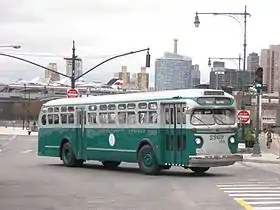 |
|
| 1949 | General Motors TDH-5102 |
2501 |
| ||
| 1952 | General Motors TDH-5104 |
2502–2551 | |||
| 1953 | 2552–2561 | ||||
| 1954 | General Motors TDH-5106 |
2562–2591 | 
|
| |
| 1956 | 3100 (preserved) | ||||
| 1957 | 7000–7208 (7144) | ||||
| 1958 | 2605–2644, 9000–9120 (9098) | ||||
| 1959 | 2645–2694 | ||||
| 1954 | Mack C-49-DT |
2990–2999 |  |
| |
| 1956 | 2962–2989, 6000–6317 (6259) | ||||
| 1958 | 3000–3009 |
Buses ordered from 1959 to 1969 [2]
These buses were all 40 ft (12.19 m) long and 102 in (2.59 m) wide, and were equipped with GM 6V71 engines to Allison hydraulic transmissions.
| Year | Builder and model name | Numbers (preserved numbers) | Picture | Notes |
|---|---|---|---|---|
| 1959 | General Motors TDH-5301 |
1–190 (100) |  |
|
| 1960 | 501–805, 3101–3220 |
| ||
| 1961 | 1001–1130 (1059) | 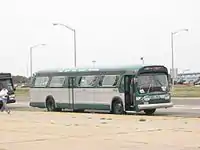 |
| |
| 1962 | 2000–2174 (2151) |  |
||
| 1963 | General Motors TDH-5303 |
3301–3555, 3601–3823, 3829–3950 (3758) |  |
|
| 1965 | 5201–5525, 6401–6900 |
| ||
| 1966 | 8001–8202, 8301–8780 (8466) |  |
| |
| 1964 | Flxible Corporation F2D6V-401-1 |
5001–5165 (5117) |  |
|
| 1965 | 5601–5800 | |||
| 1968 | General Motors T6H-5305A |
8801–8933 (8928) |  |
|
| 1969 | Flxible Corporation 111CC-D5-1 |
4000–4202, 4600–4727 (4727) |
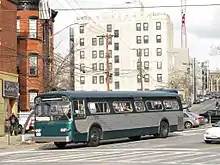 |
|
Buses ordered from 1970 to 1979 [2][3]
All buses were ordered with a GM 6V71N engine (except for 9155–9164, which had GM 8V71N engines) and Allison hydraulic 2-speed or 3-speed transmissions. All buses were 40 ft (12.19 m) long and 102 in (2.59 m) wide.
| Year | Builder and model name | Numbers (preserved numbers) |
Retired | Picture | Notes |
|---|---|---|---|---|---|
| 1971 | General Motors T6H-5305A |
4300–4499 (4401→5227) | 1992 (unrebuilt units) March 8, 1995 (rebuilt units) |
| |
| 1972 | General Motors T6H-5309A[4] |
6000–6163 |
| ||
| 1973 | 4800–4919, 6200–6349 | ||||
| 1972 | General Motors T6H-5310A[4] |
6164–6199 | |||
| 1973 | 4500–4505, 6901–6956 | early 1990s (unrebuilt units) 1998 (rebuilt units) |
| ||
| 1974 | Flxible Corporation 53102-6-1 |
7000–7204, 7300–7361 (7340) | 1990 | 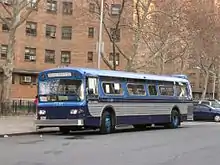 |
|
| 1975 | 7500–7659, 7700–7937 | 1993 |
| ||
| 1977 | 9000–9154, 9165–9309 | 1995 |
| ||
| 1976 | Leyland (UK) A-N-68A-2L Atlantean Double decker bus |
DD1-DD8 | 1978 |
| |
| 1977 | Flxible Corporation 53102-8-1 |
9155–9164 | 1995 |
|
Buses ordered from 1980 to 1989
The first wheelchair-accessible buses were delivered in 1981. All units here are 40 ft (12.19 m) long and 102 in (2.59 m) wide, unless noted otherwise.[5]
Buses with a "PA" prefix were funded by the Port Authority of New York and New Jersey.
Beginning in 2005, some units operated under the newly formed MTA Bus Company until retirement.
| Year | Builder and model name | Numbers (preserved numbers) |
Year Retired | Picture | Powertrain (engine and transmission) |
Notes | |
|---|---|---|---|---|---|---|---|
| 1979 | Grumman-Flxible 870A (53102-8-1) |
199 | 1984 | 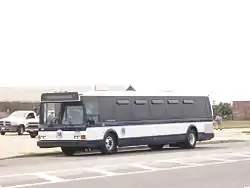 |
|
| |
| 1980 | Grumman-Flxible 870A (53102-6-1) |
PA1-PA175 201–552 601–910 (236) |
453–552 & 811–910 only |
| |||
| Grumman-Flxible 870A (53096-8-1) |
553–565 |
| |||||
| 1974– 1975 (leased 1984) |
Motor Coach Industries MC-8 (coach bus) |
5800–5949 | 1985 (returned) | Detroit Diesel series 8V71N and Allison V730 |
| ||
| 1964– 1968 (leased 1984–1985) |
Flxible and General Motors Corporation “New Look” |
Various | Detroit Diesel series 6V71N and Allison V730 |
| |||
| 1966– 1972 (rebuilt in 1985) |
General Motors Corporation rebuilt New Look |
5000–5022 5100–5159 5200–5284 5300–5404 5500–5576 (5227) |
1995 (NYCT) 1998 (Long Island Bus) |
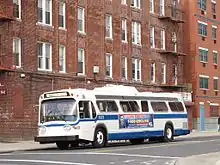 |
Refurbished Detroit Diesel series 6V71N and new Allison V730 or refurbished Allison VH9 |
| |
| 1981 | General Motors Corporation RTS-04 (T8W-204) |
1201–1317 PA1318-PA1633 2201–2300 PA2301-PA2579 (1201) |
2002 (unrebuilt units) 2005 (rebuilt units) |
 |
|
| |
| 1983 | PA3001-PA3325 | 2000 |
| ||||
| 1981 | General Motors Corporation RTS-04 (T8J-204) |
PA1634-PA1658 | 2002 (unrebuilt units) 2005 (rebuilt units) |
|
| ||
| 1982 | PA1659-PA1858 PA2580-PA2704 |
2003 (unrebuilt units) 2005 (rebuilt units) |
 |
| |||
| 1984 | 3400–3799 | 2004 (NYCT) 2007 (MTA Bus, as 1800-series) |
 |
| |||
| 1985 | 3800–4218 (4149)[6] |
 |
| ||||
| 1986 | General Motors Corporation RTS-06 (T8J-206) |
PA4300-4344 4345–4599 (4396) |
2005 (NYCT) 2007 (MTA Bus, as 1800-series) |
 |
| ||
| 1987 | Transportation Manufacturing Corporation RTS-06 (T80-206) |
4600–4899 |  |
|
Buses ordered from 1990 to 1999
All units were wheelchair accessible. Most units were 40 ft (12.19 m) long and 102 in (2.59 m) wide, but all Motor Coach Industries buses and New Flyer Industries D45S buses were 45 ft (13.72 m) long and all New Flyer Industries D60 buses were 60 ft (18.29 m) long. Following the creation of MTA Bus Company, many buses were intermittently operated under that brand.
| Year | Builder and model name | Numbers (preserved numbers) |
Year Last Retired | Picture | Powertrain (engine, transmission or propulsion system) |
Notes |
|---|---|---|---|---|---|---|
| 1990–1991 | Transportation Manufacturing Corporation RTS-06 (T80-206) |
8000–8396 8400[7] |
2010 | 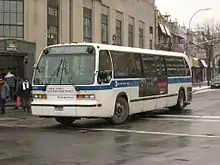 |
|
|
| 1993–1994 | 8401–8566 |  |
| |||
| 1994 | 8600–8703 |  |
|
|||
| 1991 | Transportation Manufacturing Corporation RTS-06 (T80-206) Methanol |
8397 | 2000 |
|
| |
| 1991 | Transportation Manufacturing Corporation RTS-06 (T80-206) CNG |
8398–8399 | 2001 (NYCT) 2006 (Command Bus) |
|
| |
| 1994 | 8567 | 2001 (NYCT) 2006 (MTA Bus) |
||||
| 1993 | Bus Industries of America Orion V (05.501) |
101–316 (101→93001) |
2010 |  |
|
|
| 1994–1995 | Bus Industries of America Orion V (05.501) CNG |
317, 581–610 |  |
|
| |
| 1994–1995 | Orion Bus Industries Orion V (05.501) |
400–580, 611–630 | 2010 |  |
|
|
| 1996 | 631–680 | 2014 |  |
| ||
| 1998–1999 | 6000–6349 (6326) |
2016 |  |
|
| |
| 1995–1996 | Nova Bus RTS-06 (T80-206) |
8750–9349 (8971) |
2019 | 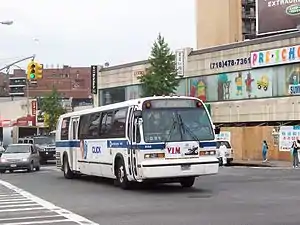 |
|
|
| 1997–1998 | 9350–9699 |
2018 | 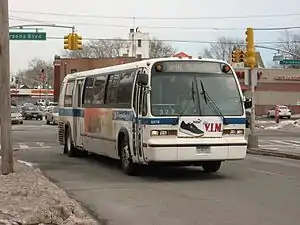 |
| ||
| 1998–1999 | 4900–5249 (5249) |
May 6, 2019 |  |
|
| |
| 1981–1982 (rebuilt in 1996) |
General Motors Corporation rebuilt RTS-04 (T8J-204 or T8W-204) |
7000–7049 7500–7559 |
2005 |  |
|
|
| 1996–1998 | New Flyer Industries D60HF (articulated) |
1000–1109, 5250–5251 | 2011 |  |
|
|
| 1999 | 5252–5509 | 2017 |  |
| ||
| 1997–1998 | Motor Coach Industries 102DLW3SS (commuter coach) |
1860–2039 | 2013 |  |
|
|
| 1999 | 2040–2139 | 2016 |  | |||
| 1998–1999 | New Flyer Industries C40LF |
800–856 | 2013 |  |
|
|
| 1999 | Orion Bus Industries 06.501 (low floor) hybrid |
6350–6359 (6350) |
2005 |  |
|
|
| 1999 | Nova Bus RTS-06 (T80-206) hybrid |
6360 | 2001 |
| ||
| 1999 | New Flyer Industries D45S "Viking" (intercity transit vehicle) |
996–998 | 2010 |  |
|
|
Buses ordered since 2000 (includes buses purchased new for MTA Bus)
All units were wheelchair accessible. Most units were 40 ft (12.19 m) long and 102 in (2.59 m) wide, but all Motor Coach Industries buses were 45 ft (13.72 m) long and all New Flyer Industries D60 buses were 60 ft (18.29 m) long.
| Year | Builder and model name | Numbers | Original operator | Year Retired | Picture | Powertrain engine, transmission or propulsion system |
Notes |
|---|---|---|---|---|---|---|---|
| 2000 | New Flyer Industries C40LF |
857–989 | NYCT | 2013 |  |
|
|
| 2000 | Motor Coach Industries 102DLW3SS (commuter coach) |
2705–2756 | 2016 |  |
|
||
| Motor Coach Industries D4500 (commuter coach) |
2757–2804 | ||||||
| 2002 | New Flyer Industries D60HF (articulated) |
5510–5559 (5534) |
2019 |  |
|
| |
| 2003–2004 | 5560–5769 |  | |||||
| 2002–2004 | DaimlerChrysler Commercial Buses Orion VII (07.501) (semi-low floor) |
6365–6489 | 2019 | .jpg.webp) |
|
||
| 2001–2003 | 7560–7684 | 2018 |  |
|
| ||
| 2004-2005 | 7685–7819 | 2019 |  |
||||
| 2005–2006 | 6490–6689 | 2020 | 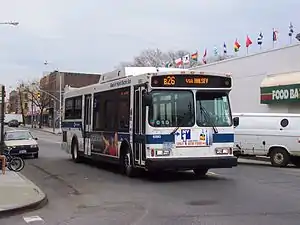 |
|
|||
| 1995–1996 (acquired 2009) |
Orion Bus Industries 05.501 |
101–184 | MTA Bus | 2015 | .jpg.webp) |
|
|
| 2009 | DesignLine Corporation EcoSaver IV (semi-low floor, turbine electric |
1302–1306 | NYCT | 2011 | .jpg.webp) |
|
|
| 2014 | Nova Bus LFS (semi-low floor) |
8090–8093 | 2015 |  |
|
| |
MTA Bus (inherited buses)
This list only includes buses that were scheduled to be inherited by MTA Bus. All buses were 40 feet long and 102 in (2.59 m) wide unless noted otherwise in the "Notes" column.[12]
Built before 1990
| Year | Builder and model name |
Numbers | Retired | Pictures (under MTA Bus) |
Notes | |
|---|---|---|---|---|---|---|
| 1982 | General Motors Diesel Division Buses New Look (S8H-5304M) suburban |
1481–1505 (1502) |
2005 | None available |
| |
| All of the GMC RTS buses listed below had Detroit Diesel series 6V92TA engines and Allison V730 transmissions. | ||||||
| 1984 | General Motors Corporation RTS-04 (T8J-204) |
1837, 1856 | 2007 |  |
| |
| 1985– 1987 |
1110–1136, 1191, 1838–1839, 1848–1850, 1857, 4221–4265, 5835–5857, 5879, 7050–7094, 8582 |
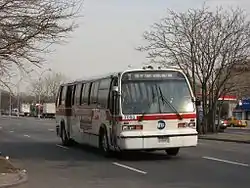 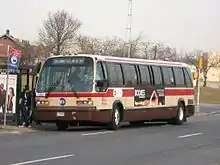   | ||||
| 1985 | General Motors Corporation RTS-04 (T8J-604) |
318–328, 1197–1199, 4266–4276, 4278–4283, 4297 |
   |
| ||
| 1986 | General Motors Corporation RTS-06 (T8J-206) |
1137–1153, 1200, 1840–1842, 1851, 1858, 5858–5878, 7095–7121 |
    |
| ||
| 1986 | General Motors Corporation RTS-06 (T8J-606) |
1154–1163, 4284–4296, 4299 |
  |
| ||
| 1987– 1988 |
Transportation Manufacturing Corporation RTS-06 (T8J-206) |
1843–1847, 1852–1855 |  |
| ||
| All of Motor Coach Industries Classic buses listed below had Detroit Diesel series 6V92TA engines and Allison V-731 ATEC transmissions. | ||||||
| 1988 | Motor Coach Industries Classic (SC40-102A) single-door suburban |
329–379, 1164–1170 5880–5881, 7122–7147 7314–7406, 7417–7422, 7820–7895, 9796–9826 (7825→Liberty Lines Express 3006) |
2007 |        |
| |
| 1989 | 7407–7416, 7896–7905 | 2008 | 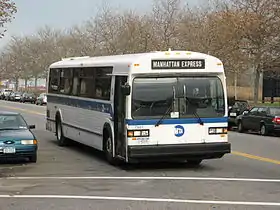 |
|||
| 1989 | Motor Coach Industries Classic (TC40-102A) transit |
1171, 5882–5893 | 2007 |  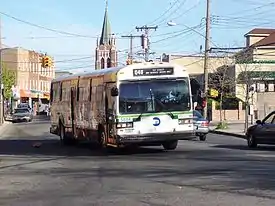  |
| |
Built since 1990
These buses were wheelchair-accessible.
| Year | Builder and model name |
Numbers | Year Last Retired | Pictures (under MTA Bus) |
Powertrain engine, transmission or propulsion system |
Notes |
|---|---|---|---|---|---|---|
| 1993– 1994 |
Transportation Manufacturing Corporation RTS-06 (T80-206) CNG |
681–707, 754, 7150–7173 (682→Command Bus 4904) |
2007 | 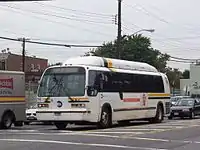   |
|
|
| Transportation Manufacturing Corporation RTS-06 (T80-206) |
1172–1190, 1192–1196 5898–5919, 5921–5924 5926–5937, 5988–5999 7148–7149, 7174–7213 9700–9726, 9728–9732 9734–9781, 9783–9795 (5904→Queens Surface 275, 5999→Jamaica Buses 3865) |
2010 |  |
|
| |
| 1997 | Orion Bus Industries 05.501 |
5938–5955 5957–5987 |
2012 |  |
|
|
| 1998 | Orion Bus Industries 05.501 (CNG) |
708–744, 746–749, 751, 7214–7273, 9932–9999 |
2013 |  |
|
|
| 1999 | 750, 7274–7285, 8568–8581, 9827–9899, 9901–9931 |
2014 | 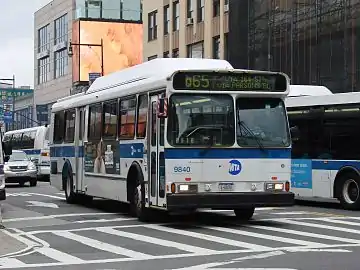 | |||
| 1999 | Orion Bus Industries 05.501 (single-door suburban) |
5894–5897 | 2010 |  |
|
|
Metropolitan Suburban Bus Authority and Long Island Bus
Built before 1966
| Year | Builder and model name |
Length and Width | Numbers | Previous operator(s) |
|---|---|---|---|---|
| 1960 | General Motors New Look TDH-4517 |
35 ft (10.67 m) • 96 in (2.4 m) | 306, 316, 565 |
|
| 1961 | 123–126, 207–211, 307, 318, 408–411, 566–570 | |||
| 1962 | 322–323 | |||
| 1960 | General Motors New Look TDH-5302 |
40 ft (12.19 m) • 96 in (2.44 m) | 457–466 |
|
| 1961 | General Motors New Look TDH-5302 |
40 ft (12.19 m) • 96 in (2.44 m) | 150, 404–407, 467–470, 626–634 |
|
| 1962 | 72–74, 321, 414–415, 456, 471–474, 600–602, 635–644 | |||
| 1961 | 571–580 |
| ||
| 1963 | General Motors New Look TDH-4519 |
35 ft (10.67 m) • 96 in (2.44 m) | 325 |
|
| 1964 | 300–305 | |||
| 1965 | 127–128, 327 | |||
| 1963 | General Motors New Look TDH-5302 |
40 ft (12.19 m) • 96 in (2.44 m) | 158–159 |
|
| 1963 | General Motors New Look TDH-5304 |
40 ft (12.19 m) • 96 in (2.44 m) | 75–78, 416–419, 475–478, 496, 645–649 |
|
| 1964 | Flxible New Look FD6V-401-1 |
40 ft (12.19 m) • 96 in (2.44 m) | 700–701 |
|
| 1964 | General Motors New Look TDH-5304 |
40 ft (12.19 m) • 96 in (2.44 m) | 420–423, 494–495, 603–605, 620–621, 650–659 |
|
| 1965 | General Motors New Look TDH-5303 |
40 ft (12.19 m) • 102 in (2.59 m) | 500–506 |
|
| 1965 | General Motors New Look TDH-5304 |
40 ft (12.19 m) • 96 in (2.44 m) | 660–668 |
|
Built between 1966 and 1979
| Year | Builder and model name |
Length and Width | Numbers | Previous operator(s) (if not MSBA/Long Island Bus) |
|---|---|---|---|---|
| 1966 | General Motors New Look TDH-5304 |
40 ft (12.19 m) • 96 in (2.44 m) | 151–154, 157, 160–162, 424–427, 670–674 |
|
| 1966 | General Motors New Look SDM-5302 suburban |
40 ft (12.19 m) • 96 in (2.44 m) | 703 |
|
| 1967 | General Motors New Look TDH-5304 |
40 ft (12.19 m) • 96 in (2.44 m) | 82–83, 479–488, 675–684 |
|
| 1967 | General Motors New Look SDM-5302 suburban |
40 ft (12.19 m) • 96 in (2.44 m) | 702 |
|
| 1968 | General Motors New Look T6H-5306A |
40 ft (12.19 m) • 96 in (2.44 m) | 100–102, 428–431, 622–625, 694–698 |
|
| 1968 | General Motors New Look T6H-5306N |
40 ft (12.19 m) • 96 in (2.44 m) | 214, 328–329, 685–693 |
|
| 1969 | 40 ft (12.19 m) • 96 in (2.44 m) | 215, 330–331, 489–493 |
| |
| 1970 | Flxible New Look 111CC-D5-1 |
40 ft (12.19 m) • 102 in (2.59 m) | 507–511 |
|
| 1970 | Flxible New Look 111CD-D5-1 |
40 ft (12.19 m) • 96 in (2.44 m) | 432–451, 669, 699, 704–705, 712–718 |
|
| 1969 | General Motors New Look T6H-5308A |
40 ft (12.19 m) • 96 in (2.44 m) | 155–156, 332–333 |
|
| 1973 | General Motors New Look T6H-5310A |
40 ft (12.19 m) • 102 in (2.59 m) | 105–112
|
|
| 1973 | General Motors New Look S8H-5304A suburban |
40 ft (12.19 m) • 96 in (2.44 m) | 113–122 (117)
|
|
| 1973–1977 | Flxible New Look 53102-6-1 |
40 ft (12.19 m) • 102 in (2.59 m) | 350–399
|
|
| 1974 | General Motors New Look T6H-5308A |
40 ft (12.19 m) • 96 in (2.44 m) | 800–849
|
|
| 1978 | Flxible New Look 53096-8-1 |
40 ft (12.19 m) • 96 in (2.44 m) | 850–902
|
|
NOTE:
| ||||
Built 1980 and later
From 1981 on, all buses for Long Island Bus were equipped with wheelchair lifts.
| Year | Builder and model name |
Length and Width | Numbers | Year retired |
|---|---|---|---|---|
| 1981 | Grumman Flxible 870-A 53102-8-1 |
40 ft (12.19 m) • 102 in (2.59 m) | 750–799, 925–999 | 1999–2000 |
| 1984 | Flxible Metro-A 40102-6T |
PA1000-PA1033 | 2000, 2005 | |
| 1985–1986 (see note 7 below) |
Neoplan USA Lit'l Bus |
30 ft (9.14 m) • 96 in (2.44 m) | 300–305 | 1998 |
| 1988 | Gillig Phantom 35TB102 |
35 ft (10.67 m) • 102 in (2.59 m) | 500–519 | 2000 |
| 1988 | Gillig Phantom 40TB102 |
40 ft (12.19 m) • 102 in (2.59 m) | 520–561 | 2000–2001 |
| 1990 | Ontario Bus Industries Orion V 05.501 |
579–599 | 2003–2004 | |
| 1991 | 600–655 (see note 1 below) |
2004–2005, 2009 | ||
| 1992 | Bus Industries of America Orion V 05.501 CNG |
656–666 | summer 2004 | |
| 1995–1996 | Thomas school bus |
Unknown | 707–710, 713 | 2001 |
| 1995–1996 | Orion Bus Industries Orion II 02.501 CNG |
25.92 ft (7.90 m) • 96 in (2.44 m) | 701, 704–706, 711 | 2001 |
| 1996 | Orion Bus Industries Orion V 05.501 CNG |
40 ft (12.19 m) • 102 in (2.59 m) | 100–105, 109–113, 115–117, and 121–141 (see note 2 below) |
2008–2009 |
| 1997–1998 | 143–245 270–287 (see note 3 below) |
2009–2011 | ||
| 2000 | 288–395 (see note 4 below) |
2011 (some units); majority sold to NICE (2012) (retired 2015–2016 under NICE) | ||
| 2002 | Coach and Equipment Phoenix (Ford E450 chassis) |
25 ft (7.62 m) • 91 in (2.31 m) | 1800–1801 (see note 6 below) |
2010 |
| 2004 | Coach and Equipment Condor (International 3200 chassis) |
1800–1801 (see note 7 below) |
Sold to NICE (2012) (retired unknown year under NICE) | |
| 2004 | DaimlerChrysler Commercial Buses Orion V 05.501 CNG |
40 ft (12.19 m) • 102 in (2.59 m) | 396–462 (see note 5 below) |
Sold to NICE (2012) (Most units retired 2016–2017 under NICE. Last units retired by Spring 2019.) |
| 2008–2011 | Daimler Commercial Buses Orion VII Next Generation 07.501 (semi-low floor, CNG) |
1700–1839 | Sold to NICE (2012) | |
| 2012 | Daimler Commercial Buses Orion VII 3rd Generation/EPA 10 07.501 (semi-low floor, CNG) |
1840–1884 | Sold to NICE (2012) (see note 9 below) | |
Notes:
| ||||
Buses ordered but never delivered
These buses were ordered with some or no units built, but were discontinued or canceled in between.
| Year | Builder and model name | Proposed numbers | Proposed operator | Powertrain engine, transmission or propulsion system |
Notes |
|---|---|---|---|---|---|
| 1995 | Flxible Metro-E 40102-4D |
1900–1949 | New York City Transit | Detroit Diesel series 50 and Allison V-731 |
|
| 2004–2005 | New Flyer Industries D60HF (articulated) |
5770–5834 | New York City Transit | Detroit Diesel series 50 EGR and Allison B500R Gen III |
|
| 2006 | DaimlerChrysler Commercial Buses North America Orion V CNG (05.501 CNG) |
463–512 | Long Island Bus | John Deree 6081H and Allison B400R Gen IV |
|
| 2012– 2013 |
Millennium Transit Services RTS Legend (semi low-floor) |
4700–4789 | New York City Transit | EPA 2013 Cummins ISL-9 and Allison B400R Gen V |
|
| 2012– 2013 |
Millennium Transit Services RTS Express (single-door suburban) |
2500–2589 | New York City Transit | EPA 2010 Cummins ISL-9 and Allison B400R Gen IV |
|
| 2012– 2013 |
Daimler Commercial Buses Orion VII EPA10 (07.501, semi low-floor, CNG) |
570–643 | MTA Bus Company | Cummins ISL-G and Allison B400R Gen V |
|
See also
Notes
- "City Buys Buses On No-Bid Basis: Emergency Approval Granted by Board-130 Vehicles to Cost $16,500" (PDF). The New York Times. November 8, 1947. pp. 1, 2. Retrieved 21 October 2016.
- NYCTA and MaBSTOA from 1960 to 1978
- Year 1978 roster for NYCTA and MABSTOA
- Custom model produced only for the MTA.
- New York City transit bus production list from 1980 to 2001
- https://www.flickr.com/photos/48073612@N04/13917200497
- Cumo, Ronald, (February/March 2008 edition) "Taking Technical" section, page 7 MTA's The Leader – Newsletter for Department of Buses Employees, retrieved November 30, 2009.
- https://www.flickr.com/photos/ck4049/5945055310/in/set-72157624060150587
- https://picturecarsltd.com/car/703-new-flyer-new-flyer-n-a/
- "Fleet Oddballs/Demos – Past Demos". Philadelphia Transit Vehicles. Retrieved 20 July 2019.
- MTA Bus renumbering list
- http://www.hopetunnel.org/temp/pbl_to_mtabus.html
- https://www.flickr.com/photos/15636971@N02/8317126139/in/set-72157629136914518
- http://newflyer.com/index/news-app/story.111 "Orion Assigns FTA-funded New York City Transit contract for 74 CNG buses to New Flyer", July 26, 2012, New Flyer
- "Archived copy". Archived from the original on 2012-09-09. Retrieved 2012-08-19.CS1 maint: archived copy as title (link) Daimler Buses Reconfigures Operations in North America
References
- Ohio Museum of Transportation – GMC TDH5301 Production List
- Ohio Museum of Transportation – GMC TDH5303 Production List
- Ohio Museum of Transportation – GMC T6H5305A Production List
- Ohio Museum of Transportation – GMC T6H5309A Production List
- Ohio Museum of Transportation – GMC T6H5310A Production List
- Ohio Museum of Transportation – Flxible F2D Models Production List
- Ohio Museum of Transportation – Flxible 111CC Models Production List
- Ohio Museum of Transportation – Flxible 53102 Models Production List
External links
| Wikimedia Commons has media related to Retired buses of MTA Regional Bus Operations. |



.jpg.webp)